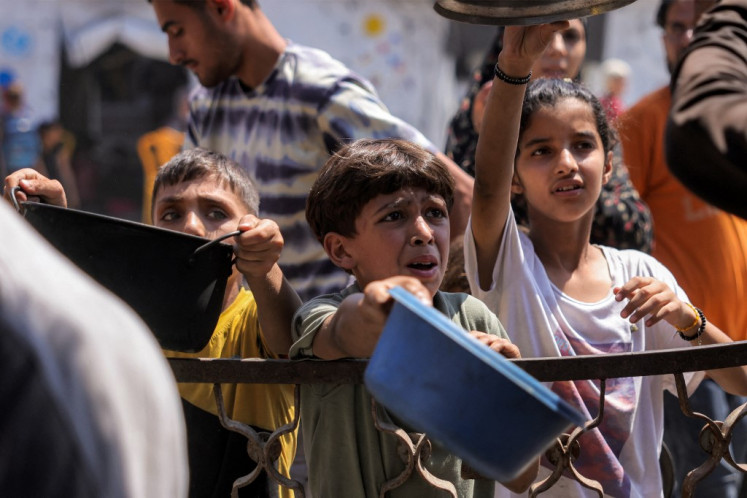Popular Reads
Top Results
Can't find what you're looking for?
View all search resultsPopular Reads
Top Results
Can't find what you're looking for?
View all search resultsGunawan Maryanto: Java in motion
(Courtesy of Bahar Sukoco)How far have the Javanese gone from their roots?Maybe not so far, according to Gunawan Maryanto, a poet and playwright who is breathing new life into old Javanese texts
Change text size
Gift Premium Articles
to Anyone
(Courtesy of Bahar Sukoco)How far have the Javanese gone from their roots?
Maybe not so far, according to Gunawan Maryanto, a poet and playwright who is breathing new life into old Javanese texts.
Take the heroic story of Roro Mendut, a strong and assertive woman from Javanese folklore. She refuses to marry a patriarch in the 17th century and fights for her love — just like a modern woman.
In Gunawan’s plays performed by Teater Garasi, the empowered character lives as: Tarling – a dangdut singer from the coastal city Indramayu in Tubuh Ketiga: Pada Perayaan yang Berada di Antara (Third Body: On Embracing What Is In-Between) and as herself in the musical Kerontjong Mendoet, which adapted Y.B. Mangunwijaya’s novel about Roro Mendut.
Yet still, the classical idea of Java remains.
Java continues to be a politically powerful island in Indonesia, hosting the nation’s capital. But the island is only a small part of the archipelago, which has grown dependent on mining and plantations, all located across the sea.
Islam is no longer a new religion that arose in opposition to Hindu-Buddhist society in the Majapahit era. The fortunes of Islam have waned and the religion has been increasingly questioned, in turn changing roles in traditional Javanese society.
Stories about the Javanese have been far from glorious. Evicted by urbanization and Western-style capitalist competition, many have set sail for other islands such as Kalimantan and Sumatra, where palm oil, coal, oil and gas remain to be exploited. Others have gone abroad as unskilled migrant workers for little pay.
Through Gunawan’s eyes, the story of the Javanese has become something contemporary. He depicts a community that no longer belongs to a tradition, yet has been disowned by modernity. Gunawan tells the story of the people in-between; children of transition, who celebrate life despite their misfortunes.
“My greatest muse is a changing Java: Java today. When I interpret the old texts, I entwine them with possibilities related to present challenges,” Gunawan says.
Tubuh Ketiga tells the story about the difficult lives of women in the poverty-stricken region of Indramayu, West Java. They don’t possess land. If they don’t choose to be dangdut singers, then they will have to go abroad as unskilled migrant workers to make a living.
As singers, the women celebrate their pain, expressing themselves through their music. They write songs about their lives and dance to them.
In the latest performance of the theater troupe, Gandamayu Repertoire, Gunawan, who wrote and co-directed the play, breathed new life into the traditional Javanese text Kidung Sudamala, a romance about young hero, Sadeva, who ends the curse placed on Uma, the wife of most powerful deity in Hinduism, Shiva.
Unlike as in the old text and in Gandamayu, the novel by journalist Putu Fajar Arcana that inspired the play, heart-broken Uma, who has been the victim of her own husband’s test of faith, chooses her own way at the end of Gunawan’s play. In the old text and the novel, Uma returns to heaven with Shiva.
Born in Sleman, Yogyakarta, Gunawan grew up with Hindu Javanese epics told as wayang shadow puppet stories by his mother, Tri Purnami.
His mother would tell Gunawan the stories before bedtime, bringing books and comic books about the Mahabharata for her young son to read. The story of the courageous knight Karna, the estranged son of Kunti and the goddess Surya before her marriage to Pandu, was his first favorite.
“My mother’s stories created my fondness of art. She introduced me to art,” said the 36-year-old man, the oldest of six children, three of whom died. His mother died in childbirth when he was 12. The baby died with her, leaving Gunawan only with his father, Sumarto, and two siblings.
Living in Karangmalang, Central Java, an area encircled by the nearby campuses of Indonesia Arts Institute (ISI) and Gadjah Mada University (UGM) in Yogyakarta, allowed Gunawan to be exposed to theater since his childhood.
He recalls watching a memorable theatrical performance when he was in fifth grade. An ISI student who rented a room at his house took him to watch a pantomime show. At the theater, there was one story about a barber and an ensemble performance about the city of Yogyakarta.
Arguments with his father made him leave home in high school. He then joined Sanggar Anom, a theater community consisting of high school students in Yogyakarta. Noted filmmaker Hanung Bramantyo was also part of the group.
Gunawan finally found a refuge and later a new home and family with Teater Garasi, then an extracurricular activity of students at UGM. It was with the theater, led by Yudi Ahmad Tajudin, that Gunawan honed his art, including his writing skill.
“The first time I wrote the script for Waktu Batu [The Persistence of Time]. Yudi encouraged me to write,” said Gunawan, who has since been the playwright behind most of the company’s performances. He has also co-directed several projects with Yudi.
Waktu Batu muses on the rigidity of time, elaborated in dance and movement in a futuristic setting. In the play, time is seen as threatening, a curse, recurring — and sometimes even cruel and uncompromising.
Gunawan, who worked with writers Ugoran Prasad and Andri Nur Latif on the project, said the script for Waktu Batu was based on several old Javanese texts including Purwakala, the story of the beginning of time; the Kidung Sudamala; Babad Watugunung, or the chronicles of Watugunung, one of the early kings of Java; and the fall of Majapahit kingdom in the 15th century.
From then on he started to pen short stories and poems, which like his plays have been largely influenced by Javanese mythology. He won the Khatulistiwa Literary Award in 2010 for his poetry collection Sejumlah Perkutut Buat Bapak (Some Turtledoves for the Old Man), which talks about his troubled relationship with his father.
“My father had many turtledoves that I never really liked. I remembered him when I wrote the book and how I struggled to communicate with him. That’s why I left home,” he said. Gunawan himself has a 7-year-old son from his divorced wife, poet Dina Oktaviani.
Harnessing poetry from his own misfortune, Gunawan said it doesn’t take loneliness to craft a creative work. Gunawan said that he always writes in a crowd, mostly between his activities with Teater Garasi.
“I grew up in the crowd, with noise. I become idle when I’m alone.”










